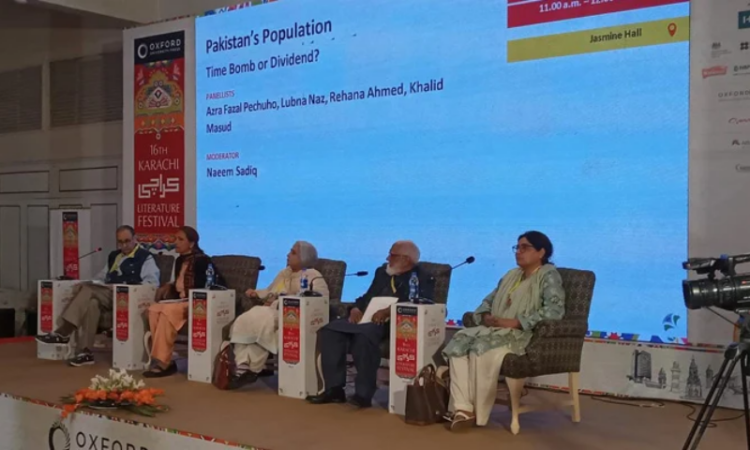Karachi, February 9, 2025: Pakistan’s soaring population and its far-reaching implications took center stage at the 16th Karachi Literature Festival, where experts raised urgent concerns about the country’s demographic trajectory. The panel discussion, featuring leading policymakers and researchers, emphasized the pressing need for strategic interventions to curb rapid population growth and turn this challenge into an opportunity.
Moderated by Naeem Sadiq, the session included insights from Dr. Azra Fazal Pechuho, Lubna Naz, Rehana Ahmed, and Khalid Masud. The experts debated whether Pakistan’s unchecked population expansion is a ticking time bomb or a potential economic asset, stressing that without immediate policy action, the country risks severe socio-economic instability.
Pakistan, currently the fifth most populous country in the world, is facing a demographic crisis. The country sees an astonishing 17,554 births every day, yet struggles to provide basic services to its existing population. More than 26 million children remain out of school, 3.3 million are engaged in child labor, 1.2 million beg on the streets, and 12 million suffer from malnutrition. Pakistan’s total fertility rate (TFR) stands at 3.6, significantly higher than global and regional averages. In contrast, neighboring countries have managed to bring down their TFRs: Bangladesh (1.9), India (2), Nepal (2), Turkey (1.6), Iran (1.7), and Taiwan (0.87). Meanwhile, all 27 EU nations maintain TFRs below 2, with France leading at 1.79.
Dr. Pechuho highlighted the dominance of the private healthcare sector, which serves over 70% of the population but remains focused on revenue-generating curative services rather than national priorities like family planning. She stressed that contraceptives are either donor-funded or imported and classified as luxury goods, making them inaccessible to a significant portion of the population due to high sales tax. “The government must take the lead in setting national goals for the private health sector,” she urged, advocating for family planning services in every clinic across the country.
The panelists agreed that investments in education, healthcare, and reproductive health services are critical to transforming Pakistan’s rapidly growing population from a burden into an economic asset. They called for a cohesive strategy between the public and private sectors to address this crisis before it overwhelms national resources, ensuring a sustainable future for generations to come.








